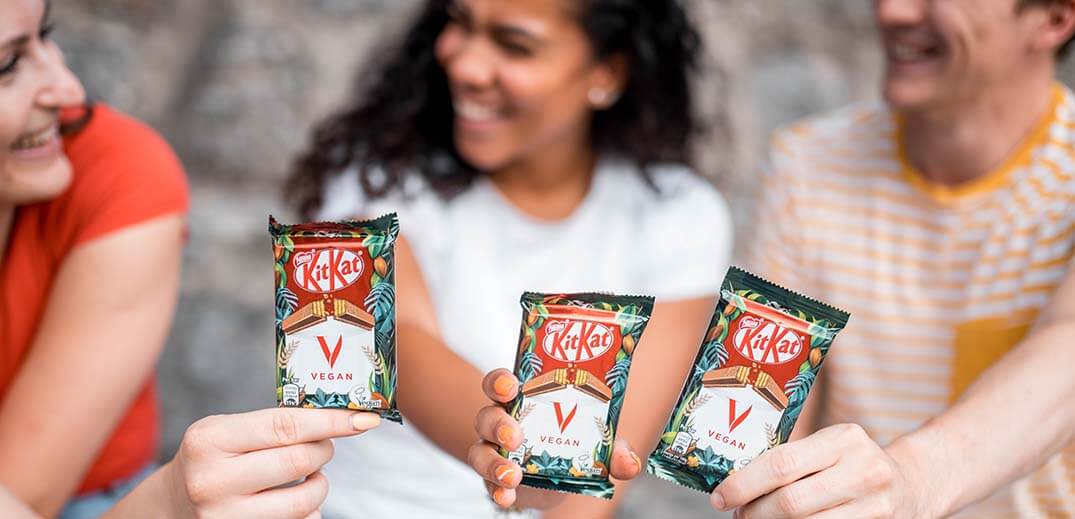Is Nestlé pulling back from Plant-Based?
- Nestlé has discontinued Vegan KitKat and scaled back Sweet Earth
- The plant-based meat market has slowed since its pandemic-era boom
- Major brands like Heinz and Pret A Manger have exited key categories
- Despite setbacks, the plant-based sector is valued at $28.38bn globally
- Future focus will be on health, clean-label, and taste innovation
Nestlé has stood at the forefront of plant-based innovation for years. From its flagship plant-based offering Garden Gourmet, to its Coffee Mate Natural Bliss Oat Milk, the Swiss manufacturer has been quick to embrace the animal-free market and celebrate its potential.
But recent years have seen a change in fortunes for the once booming plant-based trend. Signs of a market slowdown follow signs consumers are increasingly returning to animal-based products.
And, though the plant-based market is still growing, the market deceleration has spelled trouble for manufacturers such as Nestlé, who invested heavily in the sector. The Swiss multinational has now made the decision to pull its Vegan KitKat. Is this a sign of more to come?
Plant-based is struggling: a global trend
This trouble is made glaringly obvious by the number of plant-based products being taken off the shelves in recent years.
Heinz discontinued its vegan salad cream in 2024 to meet “changing culinary trends and tastes”.
While vegan protein brand Quorn removed its chilled bacon slices from shelves the same year.
“From soaring sales growth during the pandemic, plant-based alternatives – particularly plant-based meat – have slowed, with the largest market (the US) seeing negative growth since 2021," says a spokesperson for market researchers Euromonitor International. “Big-name brands have suffered; some have exited the category altogether.”
And this trend isn’t just happening in retail, the service sector is also feeling the squeeze.
Last year, British restaurant chain Pret A Manger closed the last of its Veggie Pret stores, following a less than successful run.
And, Lewis Hamilton and Leonardo DiCaprio’s vegan burger company Neat Burgers has closed down, after recording £8m (€9.23m) in losses.
It’s little wonder then that plant-based champion Nestlé is now rethinking its plant-based offering.

Is Nestlé pulling out of plant-based?
Last week brought the news that Nestlé has ceased global manufacturing of its Vegan KitKat.
This follows the food and beverage giant’s decision to pull Garden Gourmet from UK supermarket shelves in 2023. And comes shortly after the move to reduce Sweet Earth’s meat-free offerings such as plant-based chicken strips, in the US earlier this year.
Though these changes are hardly surprising, as CEO Laurent Freixe has said he believes the company placed an excessive focus on plant-based meat, only to find the market was not as big as it initially thought, according to Reuters.
So does this mean Nestlé is pulling out of the plant-based sector entirely? Nestlé did not respond to a request for comment, but we doubt it.
Despite slowing down, the plant based sector remains hugely profitable.
In fact, it’s currently valued at $28.38bn (€24.48bn) and projected to hit $176.90bn by 2032 (market analysts Data Bridge). That’s an enviable CAGR of 25.70%.
Plus, Nestlé has doubled down on its Garden Gourmet offerings elsewhere in Europe.
What we are likely to see is a change in the way Nestlé and other major manufacturers engage with the market. Where once, big-name food and beverage companies went all-in on the plant-based trend, we expect to see a far more strategic approach, with a focus on specific categories and consumer demands.
“Health is a major factor behind the shift to plant-based diets,” says a spokesperson for research organisation Global Gurus.
However, associations between ultra-processing methods and plant-based products have deterred some consumers. We therefore expect to see a shift towards clean-label and minimally processed plant-based products.
Taste and texture innovations are also expected to become the primary focus as quality takes priority over quantity in the plant-based space.
In plant-based, price matters
Having said that, with an increase in quality comes an increase in price, and this could prove to be a major sticking point for consumers. Particularly as serious price disparity was one of the reasons KitKat Vegan is believed to have failed.
In Germany, for example, a standard KitKat could be bought at discounted rates as low as €10.18/kg, whereas the vegan version was priced at €27.23/kg. Even at standard prices in supermarkets such as Rewe, Edeka, and Kaufland, the KitKat Vegan cost between €1.29 and €1.49 per bar, compared to just €0.99 and 1.19 for the regular version.
“Plant-based’s higher price point has become a bigger problem as food price inflation has gripped countries around the world,” says Euromonitor International. “Simply put, paying a premium has become more difficult for consumers.”

What’s next for plant-based?
Nestlé’s retreat from the plant-based sector reflects a wider industry recalibration, though it’s unlikely to result in a complete departure.
The plant-based market is still projected to experience strong long-term growth, and manufacturers including Nestlé will likely be keen to capitalise on this.
However, to tap into plant-based’s growth potential, manufacturers across the industry most address significant health and cost concerns.
Reformulating for healthy indulgence webinar
Want to know more about how food and beverage manufacturers are evolving with changing trends?
Join the ConfectioneryNews Reformulating for healthy indulgence webinar on 23 September 2025.





